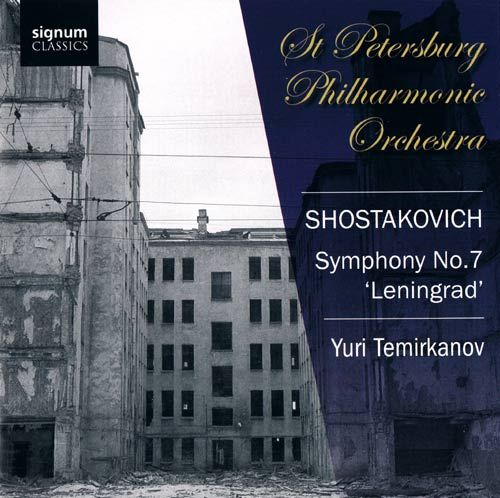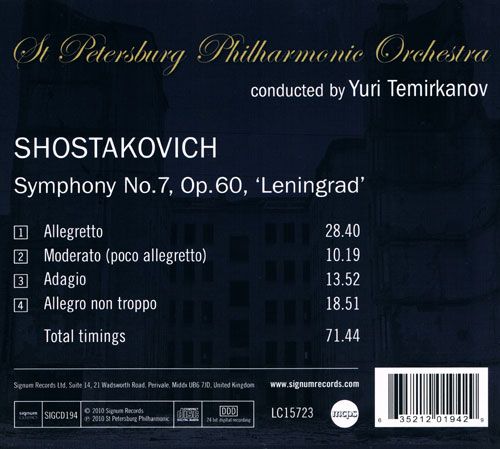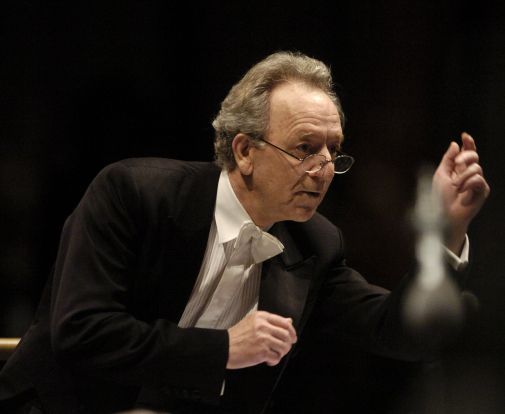wimpel69
12-05-2014, 12:27 PM
FLAC link below. This is my own rip.
Cover & booklet included. Do not share. Buy the original!
Please leave a "Like" or "Thank you" if you enjoyed this!
Few symphonies since Beethoven�s Fifth have attracted the degree of extra-musical speculation
accorded Dmitri Shostakovich�s Leningrad Symphony (Symphony No.7). Although ideas for a
Seventh Symphony had begun coming to mind the previous year, the work that emerged has
been regarded as an uninhibited response to the Nazi invasion of the Soviet Union in June 1941 -
the ensuing siege of Leningrad lasting for 870 days and costing over a million lives. Shostakovich
began working on the new symphony in the besieged city that July, completing the first three
movements by the end of September. In early October he and his wife and children were
evacuated, first to Moscow and then to the city of Kuibyshev (later Samara). He finished the
whole work towards the end of December.
The first movement begins confidently, the striding opening theme on strings in strong contrast
with the pastoral theme, featuring delicate contributions from woodwind, preceding it. This fades
out, to be replaced by an idea on pizzicato violins over a quietly insistent side drum rhythm.
Thus begins the notorious �war machine� crescendo, which replaces the expected development
section. Pizzicato violins are succeeded in turn by flute and cellos, upper woodwind and strings,
alternating oboe and bassoon, muted brass, intertwining woodwind; then violins, full strings,
horns and violins, brass and strings, upper strings and brass with percussion, finally the full
orchestral panoply, assisted by three side-drummers. A new martial theme suddenly breaks
in, driving the movement to a dramatic apex where its opening theme sounds out in baleful,
brutalised terms. The music calms to a wistful recall of the second theme, presaging a stoical
recall of the first theme by bassoon over detached piano chords. Sombre brass motifs frame
an achingly nostalgic transformation of this theme, then pizzicato strings and distant side
drum quizzically recall the �war theme� to round off the movement.
The second movement is a rare example in Shostakovich of a symphonic intermezzo, evocative
but essentially abstract in nature. The violin�s elegant opening idea is followed by a plaintive
melody for oboe, accompanied then succeeded by strings. The shrill woodwind and vaunting
brass of the central section lead to a martial theme which echoes that of the preceding
movement. The opening theme is recalled, then the plaintive melody on bass clarinet,
imaginatively accompanied by harp and flute. The first theme makes a hesitant final
appearance, and the movement ends in uneasy repose.
Plangent woodwind open the third movement with a Stravinskian chorale (the Symphony
of Psalms was a work Shostakovich studied intensively both before and during the symphony�s
composition), answered by an impassioned threnody for upper strings. The contrast is reiterated,
followed by a bassoon rejoinder. Over pizzicato strings, flutes sound out a pensive melody to
which other woodwind add their counterpoints. Strings gently take over the theme, bringing it
to an avowedly Mahlerian resting-point. The agitated central section now bursts in, goaded on
by strident brass and a raucous side drum. At its peak, the initial chorale reappears on full
brass, tailing off into a heartfelt recall of the strings� threnody. The flute theme cautiously
re-emerges, transferred to lower strings, before a recall of the threnody and its bassoon
rejoinder bring the movement to a sombre close.
Without pause, the finale opens with a fragmented theme sounding uncertainly on upper
strings and icy woodwind. A tramping rhythm for lower strings sets off the first main portion
of the movement, an energetic allegro building to a powerful, martial climax on full orchestra.
A trenchant rhythmic episode, which makes prominent use of col legno strings, slows
activity, the central section bringing elegiac exchanges between upper and lower strings,
pointed up by solo woodwind interjections. The music dies down to a hushed recall of the
movement�s opening idea, emerging from the shadows as, propelled by a revolving
rhythmic motif on lower strings, it gradually gains intensity and momentum. Various
ideas from earlier in the movement are alluded to as the music drives forward, eventually
arriving at a resplendent transformation of the work�s opening theme. From here the
symphony presses on to a combative and determined, but by no means optimistic or
triumphal conclusion.
Reaction to the Seventh Symphony has been one of extremes. The first performance,
in Kubiyshev on 5th March 1942, and the Moscow premi�re three years later were broadcast
nation-wide. Microfilmed and flown, via Tehran, to London, the work was broadcast by the BBC
on 22nd June, heard at the Royal Albert Hall a week later, then given a studio performance in
New York under Toscanini on 19th July. In Leningrad the following month, a much-depleted Radio
Orchestra, reinforced by any musician who could be released from combat during the siege of
the city, gave an account which personified the heroic aspiration of the music itself. Hundreds
of performances followed during the remainder of the war, after which the work fell out of
the repertoire, criticized for its excessive length and loose-limbed elaboration of ideas. Since
the composer�s death in 1975, it has gradually returned to favour, now with the added
possibility of its inspiration stemming as much from Stalin�s atrocities during the 1930s
as from Hitler�s subsequent brutalities. Whatever the motivation behind its genesis,
Shostakovich�s Leningrad Symphony stands as a testament to heroism and human
endurance amid overwhelming conflict and cultural crisis.

Music Composed by
Dmitri Shostakovich
Played by the
St. Petersburg Philharmonic Orchestra
Conducted by
Yuri Temirkanov

"There are two main reasons why Shostakovich's seventh symphony, the Leningrad,
still struggles to get the attention and performances now routinely accorded to so
many of its siblings. The first is its 80-minute length. The second, much more
influentially, is the unresolved controversy about what the symphony, written
during the siege of Leningrad in 1941, actually says.
Yet as performed by the orchestra, which, more than any other in the world, has
this extraordinary wartime work in its blood, the most striking thing is that the
symphony emerges as what it always said on the tin. Yuri Temirkanov and the
St Petersburg Philharmonic performed Shostakovich's seventh as a work written
on the frontline, in conditions of life and death, by a composer who might not live
to finish it. Temirkanov is not a histrionic conductor � anything but � but the
overwhelming quality of his gripping reading was the symphony's searing
immediacy rather than any more calculated ambiguity. Even the famously
derided march in the opening movement felt like what it really is, the
unsubtle but also unironic writing of an artist on the edge, bent on his
own and his city's survival. In this tremendous performance, the Leningrad
symphony came over as a testament of survival in extreme conditions
rather than as the inscrutable or ambiguous masterpiece that so many
want it to be."
The Guardian

Download Link - https://mega.co.nz/#!3Fo3zAiS!A3beWrPngvFF3XDd7xDM__PAct8CytOnJRGdHwr fxvw
Source: Signum CD, 2010 (my rip!)
Format: FLAC(RAR), DDD Stereo, Level: -5
File Size: 294 MB (incl. cover & booklet) MB
Enjoy! Don't share! Buy the origina! Please leave a "Like" or "Thank you" if you enjoyed this! :)
Cover & booklet included. Do not share. Buy the original!
Please leave a "Like" or "Thank you" if you enjoyed this!
Few symphonies since Beethoven�s Fifth have attracted the degree of extra-musical speculation
accorded Dmitri Shostakovich�s Leningrad Symphony (Symphony No.7). Although ideas for a
Seventh Symphony had begun coming to mind the previous year, the work that emerged has
been regarded as an uninhibited response to the Nazi invasion of the Soviet Union in June 1941 -
the ensuing siege of Leningrad lasting for 870 days and costing over a million lives. Shostakovich
began working on the new symphony in the besieged city that July, completing the first three
movements by the end of September. In early October he and his wife and children were
evacuated, first to Moscow and then to the city of Kuibyshev (later Samara). He finished the
whole work towards the end of December.
The first movement begins confidently, the striding opening theme on strings in strong contrast
with the pastoral theme, featuring delicate contributions from woodwind, preceding it. This fades
out, to be replaced by an idea on pizzicato violins over a quietly insistent side drum rhythm.
Thus begins the notorious �war machine� crescendo, which replaces the expected development
section. Pizzicato violins are succeeded in turn by flute and cellos, upper woodwind and strings,
alternating oboe and bassoon, muted brass, intertwining woodwind; then violins, full strings,
horns and violins, brass and strings, upper strings and brass with percussion, finally the full
orchestral panoply, assisted by three side-drummers. A new martial theme suddenly breaks
in, driving the movement to a dramatic apex where its opening theme sounds out in baleful,
brutalised terms. The music calms to a wistful recall of the second theme, presaging a stoical
recall of the first theme by bassoon over detached piano chords. Sombre brass motifs frame
an achingly nostalgic transformation of this theme, then pizzicato strings and distant side
drum quizzically recall the �war theme� to round off the movement.
The second movement is a rare example in Shostakovich of a symphonic intermezzo, evocative
but essentially abstract in nature. The violin�s elegant opening idea is followed by a plaintive
melody for oboe, accompanied then succeeded by strings. The shrill woodwind and vaunting
brass of the central section lead to a martial theme which echoes that of the preceding
movement. The opening theme is recalled, then the plaintive melody on bass clarinet,
imaginatively accompanied by harp and flute. The first theme makes a hesitant final
appearance, and the movement ends in uneasy repose.
Plangent woodwind open the third movement with a Stravinskian chorale (the Symphony
of Psalms was a work Shostakovich studied intensively both before and during the symphony�s
composition), answered by an impassioned threnody for upper strings. The contrast is reiterated,
followed by a bassoon rejoinder. Over pizzicato strings, flutes sound out a pensive melody to
which other woodwind add their counterpoints. Strings gently take over the theme, bringing it
to an avowedly Mahlerian resting-point. The agitated central section now bursts in, goaded on
by strident brass and a raucous side drum. At its peak, the initial chorale reappears on full
brass, tailing off into a heartfelt recall of the strings� threnody. The flute theme cautiously
re-emerges, transferred to lower strings, before a recall of the threnody and its bassoon
rejoinder bring the movement to a sombre close.
Without pause, the finale opens with a fragmented theme sounding uncertainly on upper
strings and icy woodwind. A tramping rhythm for lower strings sets off the first main portion
of the movement, an energetic allegro building to a powerful, martial climax on full orchestra.
A trenchant rhythmic episode, which makes prominent use of col legno strings, slows
activity, the central section bringing elegiac exchanges between upper and lower strings,
pointed up by solo woodwind interjections. The music dies down to a hushed recall of the
movement�s opening idea, emerging from the shadows as, propelled by a revolving
rhythmic motif on lower strings, it gradually gains intensity and momentum. Various
ideas from earlier in the movement are alluded to as the music drives forward, eventually
arriving at a resplendent transformation of the work�s opening theme. From here the
symphony presses on to a combative and determined, but by no means optimistic or
triumphal conclusion.
Reaction to the Seventh Symphony has been one of extremes. The first performance,
in Kubiyshev on 5th March 1942, and the Moscow premi�re three years later were broadcast
nation-wide. Microfilmed and flown, via Tehran, to London, the work was broadcast by the BBC
on 22nd June, heard at the Royal Albert Hall a week later, then given a studio performance in
New York under Toscanini on 19th July. In Leningrad the following month, a much-depleted Radio
Orchestra, reinforced by any musician who could be released from combat during the siege of
the city, gave an account which personified the heroic aspiration of the music itself. Hundreds
of performances followed during the remainder of the war, after which the work fell out of
the repertoire, criticized for its excessive length and loose-limbed elaboration of ideas. Since
the composer�s death in 1975, it has gradually returned to favour, now with the added
possibility of its inspiration stemming as much from Stalin�s atrocities during the 1930s
as from Hitler�s subsequent brutalities. Whatever the motivation behind its genesis,
Shostakovich�s Leningrad Symphony stands as a testament to heroism and human
endurance amid overwhelming conflict and cultural crisis.

Music Composed by
Dmitri Shostakovich
Played by the
St. Petersburg Philharmonic Orchestra
Conducted by
Yuri Temirkanov

"There are two main reasons why Shostakovich's seventh symphony, the Leningrad,
still struggles to get the attention and performances now routinely accorded to so
many of its siblings. The first is its 80-minute length. The second, much more
influentially, is the unresolved controversy about what the symphony, written
during the siege of Leningrad in 1941, actually says.
Yet as performed by the orchestra, which, more than any other in the world, has
this extraordinary wartime work in its blood, the most striking thing is that the
symphony emerges as what it always said on the tin. Yuri Temirkanov and the
St Petersburg Philharmonic performed Shostakovich's seventh as a work written
on the frontline, in conditions of life and death, by a composer who might not live
to finish it. Temirkanov is not a histrionic conductor � anything but � but the
overwhelming quality of his gripping reading was the symphony's searing
immediacy rather than any more calculated ambiguity. Even the famously
derided march in the opening movement felt like what it really is, the
unsubtle but also unironic writing of an artist on the edge, bent on his
own and his city's survival. In this tremendous performance, the Leningrad
symphony came over as a testament of survival in extreme conditions
rather than as the inscrutable or ambiguous masterpiece that so many
want it to be."
The Guardian

Download Link - https://mega.co.nz/#!3Fo3zAiS!A3beWrPngvFF3XDd7xDM__PAct8CytOnJRGdHwr fxvw
Source: Signum CD, 2010 (my rip!)
Format: FLAC(RAR), DDD Stereo, Level: -5
File Size: 294 MB (incl. cover & booklet) MB
Enjoy! Don't share! Buy the origina! Please leave a "Like" or "Thank you" if you enjoyed this! :)